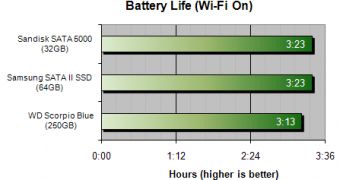The past few days brought to us some controversial news about how solid state drives actually prove themselves to be more power inefficient than efficient. It seems that the tests conducted by Tom's Hardware, which stated that SSDs would draw more battery life than HDDs, used some old versions of solid state drives, which are, as a fact, power hungry. The latest versions are much more power efficient, and manufacturers promise that the coming models will bring even more efficiency.
According to LAPTOP, Tom's Hardware omitted to set the tests right and publish all the information on the results. They say that setting the notebook close to a real user-case would show different test results, and would set the SSDs in the top of power efficiency. What they recommend is to set all power outlays to the minimum, keep the wireless network alive, boot up the notebook with maximum charge and use it to cycle through few auto refreshing web pages.
This test is meant to simulate user's web surfing with a simple shell script and with the components of the laptop, including CPU, screen, and hard drive, set to permanent wake, while the battery alerts have been disabled. The script simulates a user accessing web pages and spending some time reading them. The used browser is Firefox with disabled cache so that the pages are downloaded to the laptop every time they are accessed.
LAPTOP says that Tom's Hardware omitted to publish the amount of work achieved during their tests. According to them, this would prove that the work flow would show, in fact, power efficiency on the SSDs. The drives killed the battery faster, but power consumption would not be as disproportioned with the achieved work as stated.
The test conducted by LAPTOP showed that, under real-life web surfing conditions, the SSDs are actually more battery saving than usual HDDs. Their gain is of ten minutes over the hard disk drives, but they do last longer. The SSDs used in these tests are different from those used by Tom's Hardware, but the test may be considered conclusive.
While Tom's Hardware used drives from Crucial, Mtron, MemoRight, and SanDisk, LAPTOP used Samsung and SanDisk SSDs. The SanDisk drive used in the two test is considered to be the least performance impressive of all, but it came close to one minute less battery life than the HDD used in Tom's tests, while ten minutes longer battery in LAPTOP's. Yet, it should be noticed that the latest tests were not performance intensive and they did not require an equal amount of work from all the drives involved.
The bottom line of all these tests is that SSDs prove themselves to actually be more power efficient than old HDDs. Even if they draw the energy from the battery faster, they do it by delivering more performance. When used for simple tasks that do not put them under heavy load all the time, they last longer. Also, booting times and application launches are faster than on usual HDDs. All these are to be seen rather as gains than losses. The ten-minute battery life saving is not a considerable one, yet the SSDs prove power efficient and provide faster performance, and these facts should be taken into consideration when looking for a notebook hard drive upgrade.

 14 DAY TRIAL //
14 DAY TRIAL //